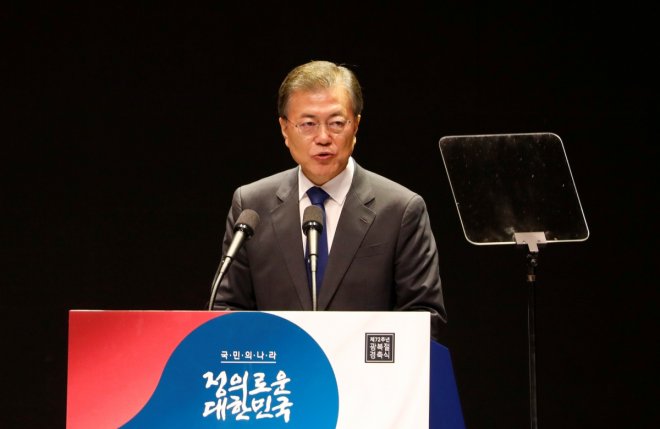
A huge cloud of uncertainty hangs above United States and North Korea. War could erupt any moment. In this volatile situation it might be worthwhile to look back at the history behind Korea as a nation it was and the eventual separation into North and South Korea.
August 15 is celebrated both in North and South Korea as the National Liberation Day of Korea. It was on August 15, 1948 that pro-US Syngman Rhee was made the first elected President of South Korea and pro-Soviet Kim Il-sung became the first President of North Korea.
Before becoming separate dominions, Korea was under Japanese rule. Japan surrendered in World War II on August 15, 1945 after witnessing an unprecedented davastation caused by atom bombs in Hiroshima and Nagasaki on August 6 and August 9 respectively. The actual surrender took place onboard the United States Navy battleship USS Missouri.
Anyway, Korea was a short-lived empire of its own from October 1897 until August 1910 when Japan formally annexed it through the Japan–Korea Treaty of 1910. During World War II, Japan used its Korean subjects for forced labour. About 670,000 were taken to mainland Japan and often forced to work in dangerous conditions with limited food and medical care and unhealthy work hours. Many women were forced into sexual slavery to satisfy the Imperial Japanese Army. Young women were often abducted from their homes.
A recent movie, 'The Battleship Island,' starring South Korean star Song Joong-ki, is about the forced labour camps for Koreans in Hashima Island of Japan, as well as comfort women who were sent here to work as prostitutes. However, the movie depicts a fictionalized account of history, taking some major liberties with actual history.
Following the surrender of Japan and the end of World War II, American forces were at the Southern part of the Korean Peninsula on September 8, 1945, while the Soviet Army and Korean communists were on the northern part. US and the then Soviet Union agreed that Korea should be split into two at the 38th parallel. With the ensuing Cold War, Korea got two separate governments.
Elections under the United Nations-supervision were held in South Korea in 1948, which was occupied by the United States, leading to the formation of the Republic of Korea. The Democratic People's Republic of Korea (DPRK) on the Northern side, was also formed immediately, supported by the Soviet Union. Two years later, North Korea invaded South Korea, leading to the Korean War (25 June 1950 – 27 July 1953) that led to the death of over 1.2 million people.
With the signing of an armistice between the two Koreas on 27 July, 1953, the Korean Demilitarised Zone (DMZ) was created but no peace treaty was signed. The two nations are still at war with each other, like India and Pakistan. India and Pakistan also gained Independence on 15 August, 1947.
Today, the threat of another Nuclear War looms large with North Korea threatening superpower United States through various provocations. Recent reports mention that present North Korean leader Kim Jong-un has decided against launching missiles towards U.S. island territory of Guam. As noted in an article by Time, South Korean president Moon Jae-in said Seoul would try to prevent a war by all means.
As per a Korean Central News Agency (KCNA) report, Kim Jong-un inspected the command of the North's army and discussed strategic plans with his commanders. He reportedly told them, "if the Yankees persist in their extremely dangerous reckless actions on the Korean peninsula and in its vicinity, testing the self-restraint of the DPRK, the latter will make an important decision as it already declared."
Initially, Pyongyang's Guam strike plans had Donald Trump threaten North Korea saying, "North Korea best not make any more threats to the United States. They will be met with fire and fury like the world has never seen." However, as reported by The New York Times, Trump is now looking forward to calm the tensed atmosphere in Asia.
A nuclear war now will have devastating impacts on the world, far greater than the effects at Hiroshima and Nagasaki. One prays that North Korea realises the meaning of the sacrifices made by the people of an undivided Korea in defeating Japan and the countless casualties they suffered. One also hopes that the United States realises that peace is the only solution.









